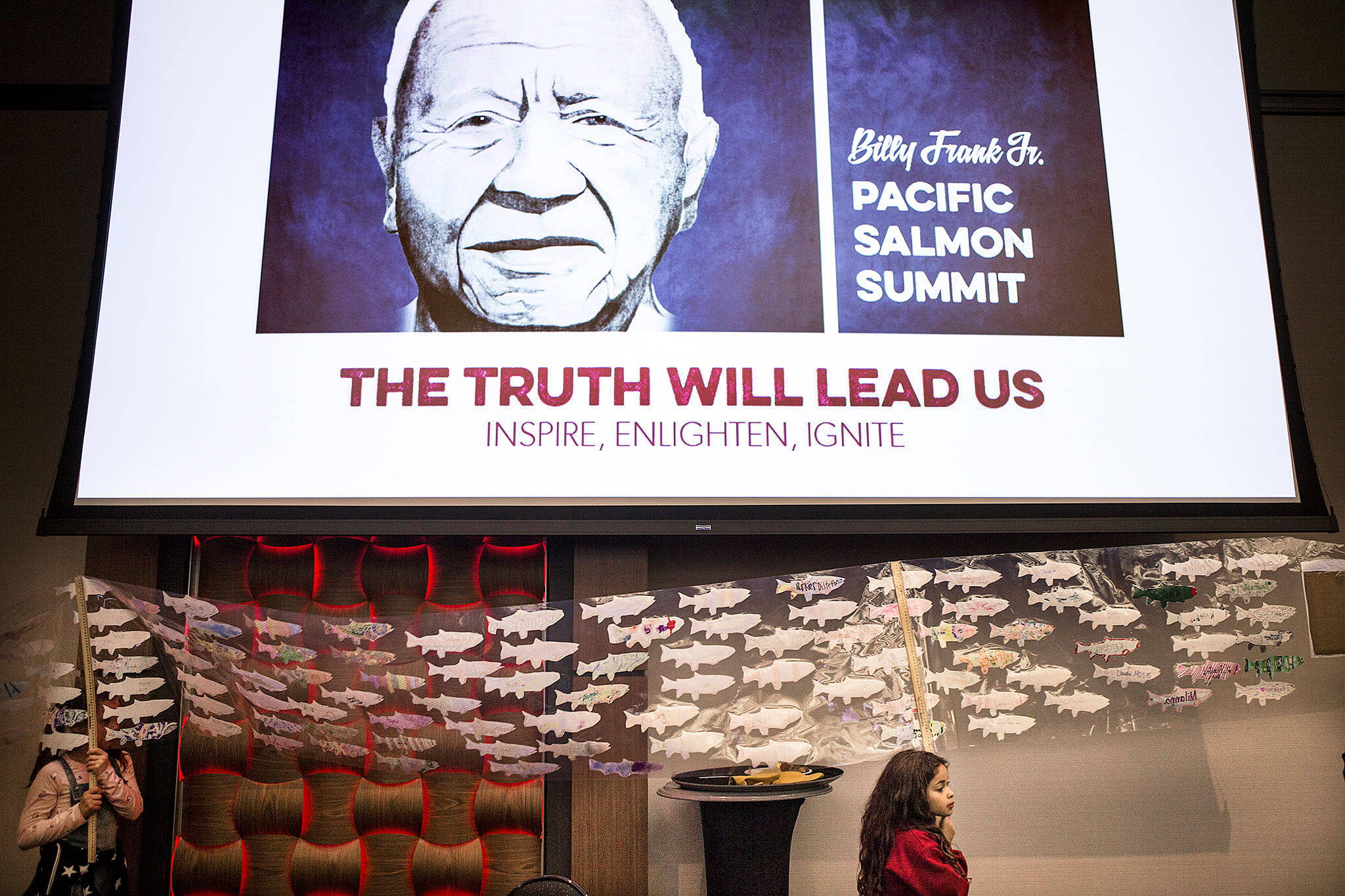TULALIP — The late Billy Frank Jr.’s spiritual and political authority echoed through a conference room Monday where tribal leaders and others issued a call to action to revive the region’s salmon runs.
The summit named in Frank’s honor took place all day at the Tulalip Resort Casino.
As Frank’s visage looked down from a screen for the welcoming ceremony, students from Quil Ceda Tulalip Elementary School carried a banner with more than 600 paper fish — one for each student and staff member. Earlier this month, the school devoted a week to honoring Frank and his legacy.
“We’re only as healthy as the salmon runs are,” said Shawn Yanity, the Stillaguamish tribal chairman. “So for us, extinction isn’t an option …”
While Yanity was close to home, others attended the summit from up and down the Pacific Coast, from California to British Columbia. The Billy Frank Jr. Pacific Salmon Summit was organized by the Olympia-based nonprofit Salmon Defense.
Glen Gobin, a longtime Tulalip leader, emceed the event. The audience included state Commissioner of Public Lands Hilary Franz and Willie Frank III, Billy Frank Jr.’s son and a Nisqually tribal council member.
“His gift was to bring people together and that’s what we’re doing today,” the younger Frank said of his father.
Frank, who died nearly four years ago, was the most recognizable face during the fish-ins of the 1960s. The civil disobedience movement opened the door to the landmark Boldt decision in 1974. The ruling by U.S. District Judge George Boldt affirmed Washington treaty tribes’ claim to a 50 percent allotment of the annual catch, as defined by agreements with the territorial government. Beyond the tribes’ share of the fisheries, it recognized their sovereign rights in a broader sense.
Charles Wilkinson, a law professor at the University of Colorado who’s a leading expert in Indian law, ranked that decision among the most significant ever reached in U.S. history on behalf of dispossessed peoples. He put the case in the same category as Brown v. Board of Education, which forced public schools to start the process of desegregation.
“The Boldt decision, many people would say, is the single-most important court decision handed down in the Pacific Northwest ever,” Wilkinson said.
The decision led to the formation of the Northwest Indian Fisheries Commission, which Frank led during its first 30 years.
Another speaker, Bill Wilkerson, served as director of Washington’s Department of Fisheries from 1982 to 1986, when state and tribal officials were finding it difficult to work together. Wilkerson recalled how unpopular the Boldt decision was at the time, especially in non-Indian coastal communities that had seen their share of the catch rapidly dwindle. He gave Frank credit for focusing attention on the importance of managing fisheries, to benefit everyone, with the help of the best available science. That focus soon came to include fish habitat as well.
“The man this conference is named after is, in my lifetime, probably the best political leader this state has ever seen,” Wilkerson said.
Wilkerson posed what might have been a key question of the day: “How are we going to proceed in working together again like we did back then?”
In that spirit, a call to action at the end of the meeting set out common goals: Tribes vowed to work to return rivers to more natural flood patterns, through floodplains and deltas; restore stream-side vegetation; and work to end federal subsidies for floodplain development, by privatizing the Federal Emergency Management Agency’s National Flood Insurance Program.
They also promised to continue trying to remove dams, tide gates, fishways, levees and culverts, while improving habitat along marine shorelines. They hope to increase hatchery production, until Puget Sound and the Pacific Ocean can maintain healthier salmon runs.
A work group will meet roughly every other month during the next year to figure out how to make those goals a reality, and to stop fisheries from collapsing.
Another important development looms at the U.S. Supreme Court. A lawsuit over whether road culverts that restrict fish habitat violate Native American fishing rights has reached the highest court in the land. Oral arguments are scheduled to start April 18.
Noah Haglund: 425-339-3465; nhaglund@heraldnet.com. Twitter: @NWhaglund.
Talk to us
> Give us your news tips.
> Send us a letter to the editor.
> More Herald contact information.

























